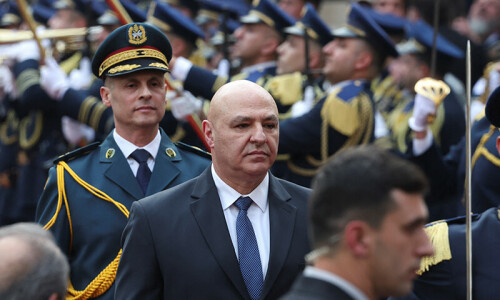BEIJING, April 10: IOC President Jacques Rogge said on Thursday the turmoil surrounding the Beijing torch relay and the politically charged buildup to the Summer Games posed a “crisis” for the Olympic movement.
Rogge urged China to respect its “moral engagement” to improve human rights and to fulfill promises of greater media freedom. He reaffirmed the right of free speech for athletes at the Beijing Games.
At the same time, the International Olympic Committee expressed relief that the San Francisco leg of the torch relay passed off without major incident and declared that the rest of the international route would not be cut short or canceled.
“This scenario is definitely not on the agenda,” Rogge said at a news conference. “We are studying together with (Beijing organizers) to improve the torch relay, but there is no scenario of either interrupting or bringing (the torch) back directly to Beijing.”
Rogge said the San Francisco relay had “fortunately” avoided much of the turmoil and disruptions that had marred the legs in London and Paris.
“It was, however, not the joyous party that we had wished it to be,” he said at the opening of a two-day IOC executive board meeting in Beijing. “Athletes in many countries are in disarray and we need to reassure them. Our major responsibility is to offer them the games they deserve. ... We have 120 days to achieve this.”
The San Francisco parade route was changed and shortened to prevent disruptions by massive crowds of anti-China protesters. The planned closing ceremony at the waterfront was canceled and moved to San Francisco International Airport, where the flame was put directly on a plane and not displayed.
Still, IOC officials were grateful that there had been no violence.
“I’m very, very happy because there was no injuries,” IOC executive board member Gerhard Heiberg of Norway said. “We were afraid of that. That didn’t happen, so this was a very good result.”
The turmoil over the torch relay and the growing international criticism of China’s policies on Tibet and Darfur and overall human rights record have turned the Beijing Games into one of the most contentious in recent history and presented the IOC with one its toughest tests.
“It is a crisis, there is no doubt about that,” Rogge said. “But the IOC has weathered many bigger storms.”
He cited the attack on Israeli athletes at the 1972 Munich Olympics and the boycotts of the 1976, 1980 and 1984 Games.
“The history of the Olympic Games is fraught by a lot of challenges,” Rogge said. “This is a challenge but you cannot compare to what we had in the past.”
Rogge was asked whether he had second thoughts about awarding the games to Beijing seven years ago.
“I’ve said that it is very easy with hindsight to criticize the decision,” he said. “It’s easy to say now that this was not a wise and a sound decision.”
But Rogge insisted that Beijing had “clearly the best bid” and offered the strong pull of taking the Olympics to a country with one-fifth of the world’s population. “That was the reasoning for awarding the bid to Beijing.”
When Beijing was bidding for the games, Rogge noted, Chinese officials said the Olympics would help advance social change, including human rights. He called it a “moral engagement” and stressed there was no “contractual promise whatsoever” on human rights in the official host city contract. “I would definitely ask China to respect this moral engagement,” Rogge said.
Rogge refused to be drawn on the prospect of top world leaders snubbing the Beijing opening ceremony. British Prime Minister Gordon Brown and German Chancellor Angela Merkel will not be attending the opening, and French President Nicolas Sarkozy is considering staying away. U.S. Democratic presidential candidates Barack Obama and Hillary Rodham Clinton have called on President Bush to boycott the ceremony.—AP















































Dear visitor, the comments section is undergoing an overhaul and will return soon.